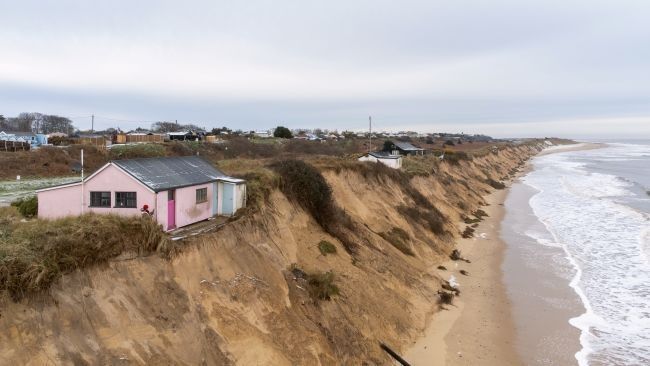
The increasing threat of coastal erosion has been highlighted after several homes in Hemsby, Norfolk were demolished before they fall into the sea.
So far, five residents who live by the coast in the village have been evacuated from their homes this year after winds of 50mph and a high tide of 3.7m.
Some of those residents were devastated as they stood by and watched their homes being demolished and collapsing onto the beach below.
In 2013 Lorna Bevan, owner of The Lacon Arms Family Pub & Restaurants, launched the Save Hemsby Coastline. Since then, she’s worked with other members of the community to raise public awareness of the coastal erosion predicament facing Hemsby and to raise funds to help protect their dunes.
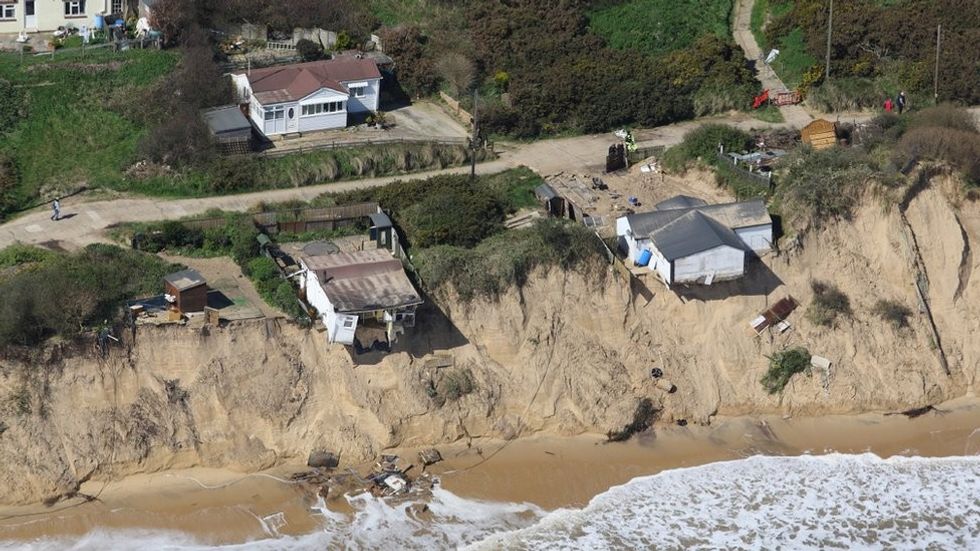
She says that the rapid increase in the coastal erosion in Hemsby has meant they are now at a “critical point”.
She argues that if they were listened to eight to ten years ago, they would have a much wider beach than they do now.
She added: “We need an injection of money to get the rock berm that we have successfully applied for and got planning permission.
“We can see that also without this rock berm we are losing our beach, which is the financial stability for the whole area,” she said.
Locals say there have had numerous extreme high tide events over the years which have caused more homes to be lost. They say Hemsby has no sea defence, other than the accretion of sand known locally as the Marrams.
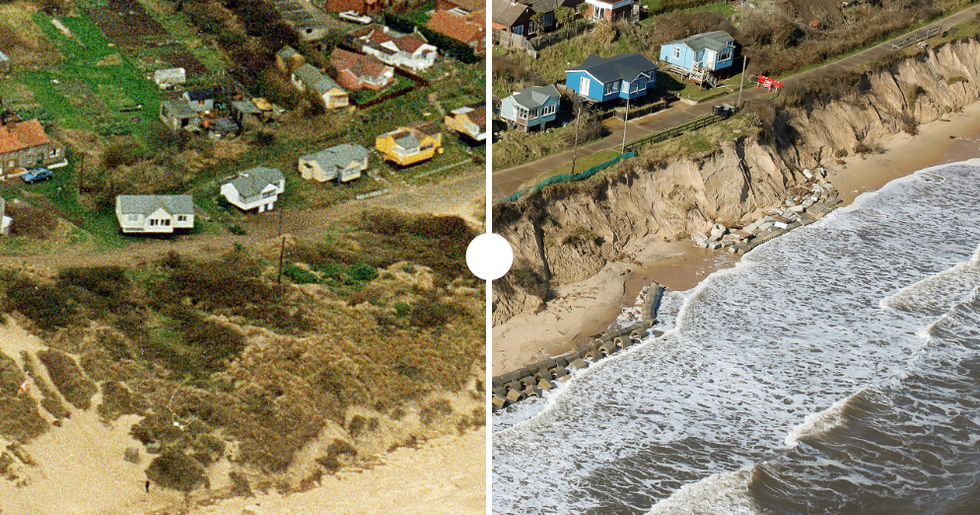
This year up to five homes built on sand dunes in the Marrams have been evacuated after high tides and winds left them in a “precarious condition,” according to Great Yarmouth Borough Council after they were served section 77 notices, of the Building Act 1984.
At times, this year the Hemsby beach has been closed off to the public due to significant coastal erosion.
Simon has lived in Hemsby for about three years, after moving from Northamptonshire with his wife. What drew them to the area was the people and having a beach on their doorstep.
He says changes have happened very quickly, after nothing seemed to happen for four to five years. It was a “little bit of erosion” and a “few storms,” before things stabilised.

He added: “And then the last two three years, everything’s changed from being an open road for cars to be on it, to a road that’s only safe for pedestrians, then they put a no access road in and now that road has collapsed so it’s not usable anymore.
“So, for the people living here it’s just changed everything. For a long period of time, we couldn’t get bins emptied, we didn’t get post, we couldn’t get DPD or anybody else to deliver anything here. In effect, we became cut off. It was only when rocks were put it and they stabilised that part of the road, that the post office came and delivered some mail to us.”
A scheme for the protection of Hemsby has been developed, in the form of a rock berm. The permissions needed to build such a scheme are almost complete and the work can be moved forward as soon as funding is found.
However, it’s been a challenge to fund the scheme of this nature. Great Yarmouth Borough Council estimate it’ll cost around £15 million, with only around £2.5 million available from Government Grant in aid.

Other funding will need to be found and Coastal Partnership East, the Council’s coastal management team, are working to explore all possible funding options but this is more challenging with inflation and rising cost of materials.
According to the British Geological Survey, the coastal frontage at Hemsby comprises a narrow zone of vegetated sand dunes of very loosely consolidated sand, situated behind a narrow beach. Its weak geology makes the coastline susceptible to this erosion.
Regional Geologist from British Geological Survey, Jonathan Lee, added: “Beaches are great natural coastal defences because they act to dissipate wave energy, but at Hemsby, because the beach is so narrow, the erosional susceptibility of the geology is enhanced because of direction wave action on the cliffs.
“This occurs under both normal tidal and weather conditions and especially during high tides and storms.”
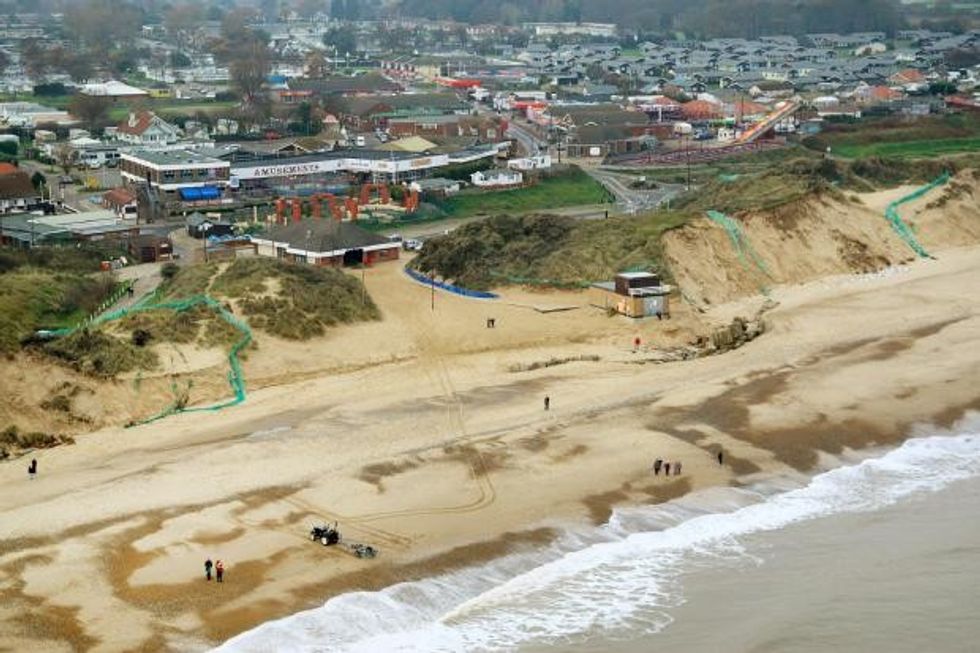
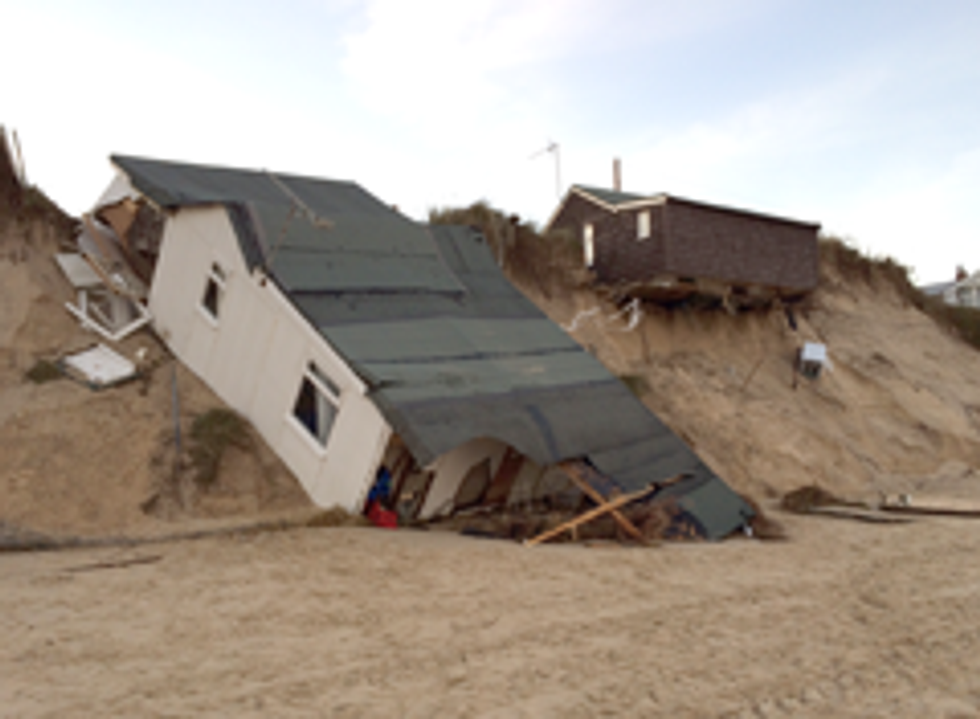
The council told GB News: “The emergency works put in place earlier this year are providing important protection to the access road at The Marrams, enabling people to get to their homes safely and protecting the route for services and emergency vehicles. Coast Partnership East, the coastal management team for Great Yarmouth Borough Council, are working on options for those affected and also the wider community.
They added: “Cost of materials and construction of coastal schemes are still rising. A wider scheme will need to be reviewed in that context. It is unlikely that Central Government can provide the full funding needed given the scale of the scheme for the number of properties protected.
"A business case, reviewing possible options and funding sources is being developed.
Meanwhile, the council continues to engage with the landowner of the Marrams, Geoffrey Watling (Norwich) Ltd, seeking its support in addressing the erosion challenges in Hemsby.
from GB News https://ift.tt/VnwWkLU

The increasing threat of coastal erosion has been highlighted after several homes in Hemsby, Norfolk were demolished before they fall into the sea.
So far, five residents who live by the coast in the village have been evacuated from their homes this year after winds of 50mph and a high tide of 3.7m.
Some of those residents were devastated as they stood by and watched their homes being demolished and collapsing onto the beach below.
In 2013 Lorna Bevan, owner of The Lacon Arms Family Pub & Restaurants, launched the Save Hemsby Coastline. Since then, she’s worked with other members of the community to raise public awareness of the coastal erosion predicament facing Hemsby and to raise funds to help protect their dunes.

She says that the rapid increase in the coastal erosion in Hemsby has meant they are now at a “critical point”.
She argues that if they were listened to eight to ten years ago, they would have a much wider beach than they do now.
She added: “We need an injection of money to get the rock berm that we have successfully applied for and got planning permission.
“We can see that also without this rock berm we are losing our beach, which is the financial stability for the whole area,” she said.
Locals say there have had numerous extreme high tide events over the years which have caused more homes to be lost. They say Hemsby has no sea defence, other than the accretion of sand known locally as the Marrams.

This year up to five homes built on sand dunes in the Marrams have been evacuated after high tides and winds left them in a “precarious condition,” according to Great Yarmouth Borough Council after they were served section 77 notices, of the Building Act 1984.
At times, this year the Hemsby beach has been closed off to the public due to significant coastal erosion.
Simon has lived in Hemsby for about three years, after moving from Northamptonshire with his wife. What drew them to the area was the people and having a beach on their doorstep.
He says changes have happened very quickly, after nothing seemed to happen for four to five years. It was a “little bit of erosion” and a “few storms,” before things stabilised.

He added: “And then the last two three years, everything’s changed from being an open road for cars to be on it, to a road that’s only safe for pedestrians, then they put a no access road in and now that road has collapsed so it’s not usable anymore.
“So, for the people living here it’s just changed everything. For a long period of time, we couldn’t get bins emptied, we didn’t get post, we couldn’t get DPD or anybody else to deliver anything here. In effect, we became cut off. It was only when rocks were put it and they stabilised that part of the road, that the post office came and delivered some mail to us.”
A scheme for the protection of Hemsby has been developed, in the form of a rock berm. The permissions needed to build such a scheme are almost complete and the work can be moved forward as soon as funding is found.
However, it’s been a challenge to fund the scheme of this nature. Great Yarmouth Borough Council estimate it’ll cost around £15 million, with only around £2.5 million available from Government Grant in aid.

Other funding will need to be found and Coastal Partnership East, the Council’s coastal management team, are working to explore all possible funding options but this is more challenging with inflation and rising cost of materials.
According to the British Geological Survey, the coastal frontage at Hemsby comprises a narrow zone of vegetated sand dunes of very loosely consolidated sand, situated behind a narrow beach. Its weak geology makes the coastline susceptible to this erosion.
Regional Geologist from British Geological Survey, Jonathan Lee, added: “Beaches are great natural coastal defences because they act to dissipate wave energy, but at Hemsby, because the beach is so narrow, the erosional susceptibility of the geology is enhanced because of direction wave action on the cliffs.
“This occurs under both normal tidal and weather conditions and especially during high tides and storms.”


The council told GB News: “The emergency works put in place earlier this year are providing important protection to the access road at The Marrams, enabling people to get to their homes safely and protecting the route for services and emergency vehicles. Coast Partnership East, the coastal management team for Great Yarmouth Borough Council, are working on options for those affected and also the wider community.
They added: “Cost of materials and construction of coastal schemes are still rising. A wider scheme will need to be reviewed in that context. It is unlikely that Central Government can provide the full funding needed given the scale of the scheme for the number of properties protected.
"A business case, reviewing possible options and funding sources is being developed.
Meanwhile, the council continues to engage with the landowner of the Marrams, Geoffrey Watling (Norwich) Ltd, seeking its support in addressing the erosion challenges in Hemsby.



0 Comments
Don't share any link